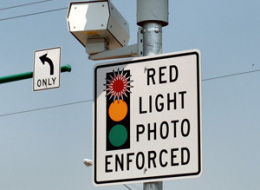 As Florida lawmakers gear up for another debate about red-light cameras, a Brevard County citation has led to a class-action lawsuit about the constitutionality of the devices.
As Florida lawmakers gear up for another debate about red-light cameras, a Brevard County citation has led to a class-action lawsuit about the constitutionality of the devices.
The lawsuit focuses on red-light cameras in Cocoa Beach. But attorney Stephen Koons said it also challenges the constitutionality of a 2010 state law that has led to cameras popping up across Florida.
“I think the hammer’s about to fall — that’s my opinion,” Koons said Thursday.
Koons has represented Cocoa Beach resident Mary Lombardo in a months-long legal fight stemming from a $158 citation she received in September 2010. He filed the class action this month in Brevard County circuit court, though Cocoa Beach last week requested that the case be moved to federal court in Orlando. Koons said he hopes to keep the issue in state court.
The cameras are a controversial issue in communities throughout Florida and in the Legislature. They snap images of motorists who don’t stop at red lights, starting the process of citations being issued.
Lawmakers in 2010 passed a law that approved and set standards for the use of cameras. But this spring, a legislative debate broke out about trying to repeal the law — a debate that already shows signs of flaring again in 2012.
Supporters argue that the cameras help prevent traffic accidents, particularly at busy intersections. Also, the citations provide money to local governments, which typically split revenue with private vendors that install and operate cameras.
The lawsuit contends, in part, that the state law and a Cocoa Beach ordinance are unconstitutional because people who dispute red-light citations do not have the ability to cross-examine witnesses. That is because cameras, as opposed to police officers, are the sources of the citations.
Also, it contends that the law and ordinance are unconstitutional because motorists have to forfeit their right to remain silent if they hope to fight the citation. Disputes could arise, for example, if the owner of a vehicle receives a citation but was not the actual driver of the car at the time of the red-light violation.
An attorney for the city of Cocoa Beach and a spokesman for vendor American Traffic Solutions Inc. could not be reached for comment Thursday afternoon.
But on its city website, Cocoa Beach says the cameras are a way to increase law enforcement in more locations.
“As a tourist destination, Cocoa Beach has more vehicular and pedestrian traffic than many other communities,” the website says. “The mixture of cars and people increases the chances that a mishap can result in a serious injury of worse. It also underscores the importance of compliance with traffic regulations.”
Koons initially filed a lawsuit in April seeking an injunction. But Cocoa Beach successfully argued that Lombardo could not challenge the cameras because she had already voluntarily paid the fine.
That led to the attorney filing an amended complaint this month, with Lombardo as a named plaintiff in a class action. The lawsuit seeks reimbursement for motorists who have received fines because of the Cocoa Beach traffic cameras.
By Jim Saunders


